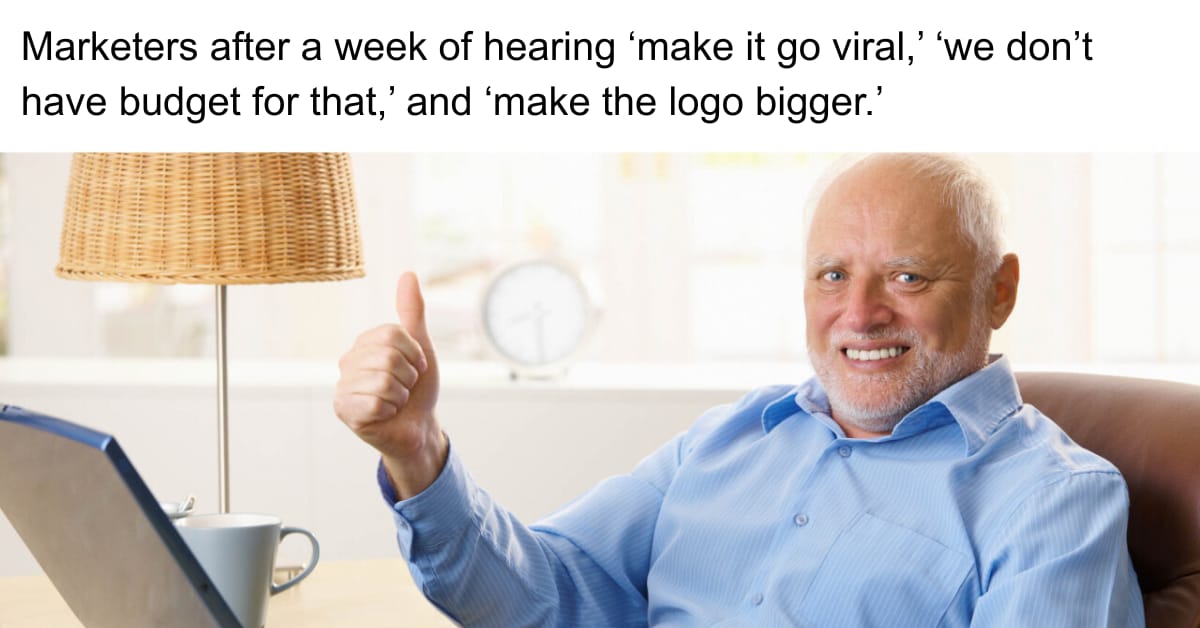- The Dementia Newsletter, by elumenEd
- Posts
- Asker vs Guesser Families: Dementia Does Make Guessers of Us All
Asker vs Guesser Families: Dementia Does Make Guessers of Us All
Also in this edition: Would you take a quick survey for senior living leaders? I'm presenting results at a Think Tank in Austin in December, and your answers could shape the discussion for years to come.

In this edition: |
|---|
• ☑️ Take a Survey and Change the Senior Housing Industry ☑️ |
Sponsored:
The best marketing ideas come from marketers who live it.
That’s what this newsletter delivers.
The Marketing Millennials is a look inside what’s working right now for other marketers. No theory. No fluff. Just real insights and ideas you can actually use—from marketers who’ve been there, done that, and are sharing the playbook.
Every newsletter is written by Daniel Murray, a marketer obsessed with what goes into great marketing. Expect fresh takes, hot topics, and the kind of stuff you’ll want to steal for your next campaign.
Because marketing shouldn’t feel like guesswork. And you shouldn’t have to dig for the good stuff.
An Important Poll: the Industry Needs Your Voice
Hi all. I have a favor to ask: if you are 55 or older, would you please take the survey you can find at this link.
What it is: I’m asking you to complete this survey because I’ve been invited to participate in an industry Think Tank in Austin this December.
Why it’s crucial: I’m in a small group assigned to work on the topic of “senior perspectives.” The survey results will give us a valuable perspective—your perspective—to bring to innovators in the senior housing business.
Your answers will reach some of the top leaders and innovators in senior living directly.
Please click over to this survey to give your input.
Help Keep the Caregiver Stories Coming
If this newsletter has helped you, would you consider supporting it?
Every week, I pour my heart into these words to make your caregiving journey a little lighter and less lonely. Many of you have shared how these stories have brought comfort, perspective, or even a smile on a hard day.
If you’ve ever found a moment of relief or recognition here, I hope you’ll consider tipping—$5, $10, or whatever feels right to you. Your support helps me keep writing, and reminds me how much this work matters.
Thank you for being part of this community.
Caregiver’s Corner: Askers, Guessers, and Dementia Communication
I think we all have our own special ways of being frustrated. For me, when I get frustrated (or angry, or whiny, or other things I’m not happy to admit to), I’m generally trying to communicate that I don’t feel like someone is listening.
In many ways, I think that my “style” of getting upset mirrors a lot of what happens for a person with dementia who becomes upset. I’m going to start today’s column by talking about two different communication styles, and then I’ll tie it back to dementia communication.
So, not long ago, a friend pointed out to me the different between asking and guessing styles of communication. Askers use their words and state clearly what they want. It’s a direct way of communicating where “yes” means “yes,” and “no” means “no.” This is my partner’s style of communication. When she needs something or feels a certain way, she says so. Easy peasy lemon squeezy.
I am trying to be more like her, but I grew up in a guessing family. I had two older half-brothers, but I was a surprise for my May-December mother and father, so the brothers were out of the house by the time I can remember anything. I grew up as essentially an only child with two parents who worked out of our home.
We had an intricate method of communication, based on tone of voice and etiquette. For instance, it was impolite to say “no” to a request. In order to say “no,” the way we would say “yes” had to signal “no” somehow. The person receiving the “yes” must be so in tune with the other person that they would realize by indirect methods that you’re actually saying NO! It’s remarkably subtle, indirect, and incomprehensible to people outside of that small circle.
Direct Ask requests often come across as the communication equivalent of backing people into a corner, which Guess people are likely to take as presumptuous and feel put out. Conversely, Ask people may see Guess’s vague hints and veiled remarks as passive aggressive, and be irritated at having to interpret whether a yes is a yes or actually a no.
For instance, a typical Ask request might look like “Hey, I need your help with this project. Can you help me?” A Guess request, on the other hand, might not sound like one at all: “I have this really difficult project that I’m not sure how to start…”
One is straightforward but requires a hard yes or no answer. The other disguises itself as a statement to avoid appearing an imposition, but implies an expectation for help to be offered — which can often lead to hurt feelings if missed or misunderstood.
Here’s an example from an interaction with my mom who has dementia: my partner, Chava, and I took my mom out to eat about a year ago, and they had indoor and outdoor seating at the restaurant. Chava loves to sit outside in the nice weather, so she asked my mom if that would be ok. Mom said “yes.”
But she didn’t. She really said “no,” but only I could hear that. It was in her tone of voice and body language. However, because Chava is an asker and she didn’t grow up with the baffling communication we used in my family, there was no way for her to know that. Additionally, because of mom’s dementia, she didn’t necessarily have the words to advocate for her desires even if she did want to go against the flow. She defaulted to my family’s version of polite.
“Mom, would you prefer to sit inside?” I asked.
“Well, yes.”
I’m in the inner circle of that guessing relationship with my mom, so I understand communication with my mom in ways that have been refined over almost 50 years. The same thing that allows us to burst into laughter at just a glance at each other also allows me to see needs and decode messages that others can’t hope to understand.
If your loved one is a “guesser,” as dementia becomes more prominent you will have a special insight into your loved one. If they have outside help or live in a community, you may want to have some conversations with caregivers about that communication style.
The really difficult thing, however, is that as dementia progresses everyone becomes a “guesser.” As words slip away and people can’t express their needs, we have to look at those cues.
As difficult as it can be in some ways to come from a family where so much is guessed, unstated, and silently cued, I have had a lifetime of practice understanding my mother beneath the words she is saying. I find that, as language slips away, I still understand much of what she’s feeling. I’m finely attuned to her needs in a way that I couldn’t be if I had grown up in an asking culture.
Every strength has a weakness built into it, and every weakness has a strength. My weakness as a “guesser” is that my feelings can be hurt when my indirect communication is not understood. But my strength is that I read people carefully and wring every iota of meaning out of every gesture and change in tone. I’m very sensitive to what is being said, what is not being said, and what pieces of meaning come from non-verbal cues.
As you communicate with someone who is progressing through dementia, have you made your peace with becoming somewhat of a guesser? At some point, the non-verbal is what will be left. Start cultivating that guessing skill: what does it mean when their eyes flick to something? Do they have a particular look or habit when they need the bathroom? Do they get agitated every time a certain issue comes up?
You don’t have to guess correctly every time: the simple fact that you care enough to dig into the question can often be validating unto itself. When I get frustrated because someone isn’t reading my signals correctly, it always calms my agitation if they just tell me something like “I don’t understand what you’re feeling right now, but I’m trying.” It tells me that they understand that I’m trying too and we both have the same goal. I’m not being difficult on purpose: I’m hurting because someone I care about doesn’t understand me.
If your loved one is frustrated, agitated, or angry, is it possible that it is because they are sending a message that you’re not receiving? Being unheard feels so lonely. I speak from experience. Can we look deeper into what is being (un)said and make some educated guesses to communicate deeper than the spoken, to hear what cannot be said?
As I think about communication, it occurs to me that my mom and I will still catch each other’s glaces and burst into laughter without any word being spoken. I don’t necessarily know what the joke is anymore: maybe we’re just laughing because we understand something no one else does. There is simply a private joy that no one else has access to but the two of us, and sharing that private laughter with her is one of the great blessings of life. We keep the joke in our hearts, not our words. I couldn’t “ask” for more.
Video: Asking vs. Guessing—Sitcom Edition
📰 Additional Reading 📰
More information on the Ask vs. Guess Cultures from Various Perspectives:
Navigating ‘Ask’ and ‘Guess’ Cultures in a modern world (Medium): a nice breakdown of Ask and Guess cultures addressed in today’s “Caregiver’s Corner”
Ask and Guess (GreaterWrong): another take on the subject of Ask vs. Guess and how to navigate the situation. Some of the comments on this article are quite thoughtful.
Ask vs. Guess Culture at Work (PerformanceFrontiers): a PDF article about how these two cultures can play out in a work situation.

Ben Couch, author
I’ve been a dementia professional for over 20 years, but the fight against this disease has become much more personal for me as I am engaged in my mother’s journey with Alzheimer’s disease. I started The Dementia Newsletter as well as it’s parent company, elumenEd, to help caregivers — specifically home and family caregivers — gain access to the very best training and information available at an affordable price.
SOME OF THE LINKS IN THIS NEWSLETTER ARE AFFILIATE LINKS, WHICH MEANS WE MAY EARN A COMMISSION IF YOU CLICK AND MAKE A PURCHASE, AT NO ADDITIONAL COST TO YOU. WE ONLY RECOMMEND PRODUCTS AND SERVICES WE TRUST.
At The Dementia Newsletter, we’re dementia professionals but we’re not medical doctors or lawyers. The information provided is for general informational purposes only and should not be considered as medical or legal advice. Always consult with a qualified healthcare professional for medical diagnosis, treatment, or any health-related concerns and consult with a lawyer regarding any legal matters.



Reply